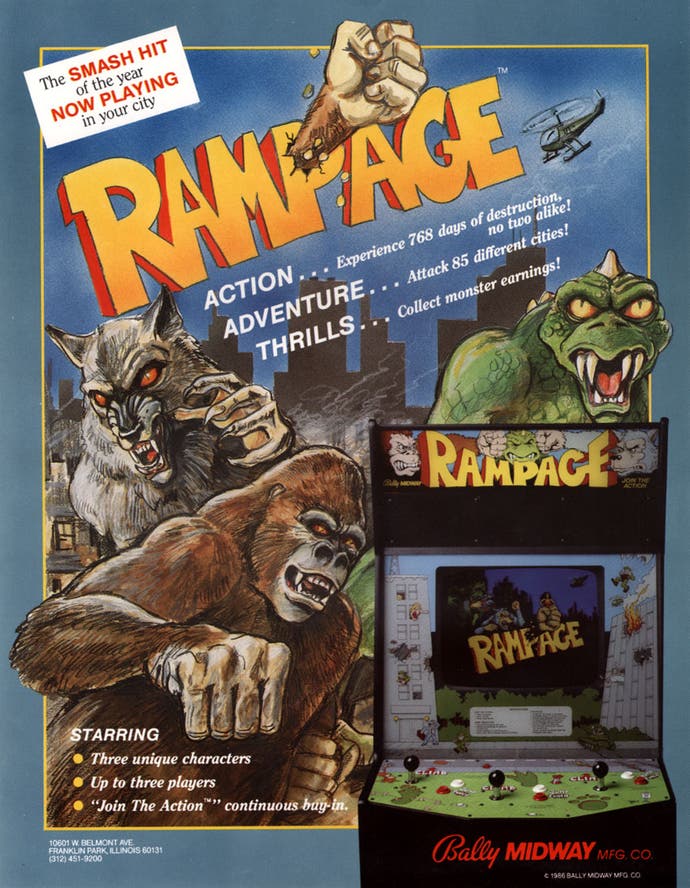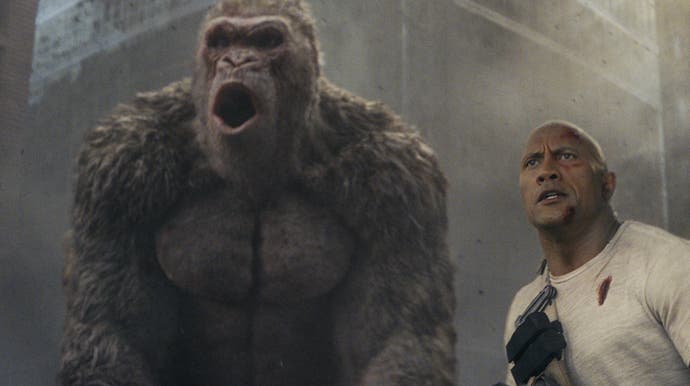Rampage film review - even shallower than the arcade game
Ape escapism.
Last year, the New York Times ran a fascinating, faintly scary story about Hollywood's intellectual property crisis. Through the lens of one producer's desperate attempt to make a film out of the mobile game Fruit Ninja, the piece explored how the major movie studios' retreat from risk of any kind had led to a market where films were vastly more likely to get made if they had some kind of recognisable licence attached - even if that property featured no characters or obvious storytelling potential. Films were being made out of old board games, toy lines, even emojis.
This, I assume, is how we have ended up with a film based on Rampage. Bally Midway's 1986 arcade hit is a game of mindless destruction in which players control three giant monsters - an ape, a werewolf, a lizard - and scale and smash up skyscrapers, reducing them to rubble for high scores. It's a gleeful inversion of King Kong and Godzilla, and of the video games they inspired like Donkey Kong. It's fondly remembered and still fun to play today, but it's hardly a crown jewel of gaming intellectual property; it was revived in the mid-90s and limped through a few sequels before disappearing once again from our screens. And it is somehow now a major motion picture starring Dwayne Johnson.
Why? Honestly, I couldn't tell you. My best guess is that Rampage was the cheapest available existing property that afforded the studio, New Line, an opportunity to reunite the trio of Johnson, director Brad Peyton and collapsing buildings that had done so well for all concerned in 2015's San Andreas. You can't really make a sequel to a film about an earthquake. You can, however, reproduce its wheeling aerial shots of crumbling masonry and hope that a little nostalgic name recognition will help mitigate the cost of making them.
The welcome news for moviegoers is that Rampage is a good-humoured, watchable romp that doesn't take itself too seriously and clears the extremely low quality bar set by previous video game adaptations (including, as Johnson himself is keenly aware, 2005's dreadful Doom). It's an adequate popcorn flick with a serviceable script, a game, if budget, supporting cast, and the indeterminate, overlit aesthetic of contemporary digital blockbusters. In the garbled early stages it shows signs of having been hacked down pretty mercilessly to its 107-minute running time, but the story is slight enough to survive the indignity. It's powered by Johnson's likeable screen persona: the clean-cut beefcake, the self-deprecating, caring man of action, encircling a grateful world in his reassuringly mighty arms. "Don't fight it," he says as he regretfully, almost tenderly chokes out a soldier in Rampage. "It's a big arm."
Sunny-side-up Arnie: it's a wonderful shtick, but as much as he is the film's greatest (only) asset, Johnson's essential decency and morality completely change the context of Rampage. He plays Davis Okoye, a primatologist - and a former special forces soldier, of course, but one who has devoted his life to caring for animals after a spell on a UN anti-poaching task force. He works at a wildlife reserve where he enjoys a cross-species bromance with George, an albino gorilla who knows sign language and is built more to his scale than most humans. They make childish jokes together and bump fists. Somehow, Johnson sells this relationship, one great lunk to another.

When an evil corporation's secret space station testing facility disintegrates, three canisters containing an incredibly powerful genetic pathogen survive re-entry and strike the continental US. Three animals are contaminated and grow to gigantic size, also becoming incredibly aggressive and virtually indestructible. George is one. Another is a wolf, who for some reason gains the ability to fly, and the third was probably an alligator once but, by the time it shows up at the end of the film, it has become a generic mishmash of dragon and dinosaur. In an attempt to manage the unmanageable and recoup their investment, the evil corp uses a radio signal trigger to summon the monsters to its Chicago skyscraper HQ. Via this sequence of immaculate nonsense is the film's only real debt to the game set up: the iconic image of the three beasts clawing and smashing their way up a column of steel and glass.
However, in tailoring the plot to Johnson's arrow-straight appeal and fitting Rampage with a toothless, standard-issue moral about man irresponsibly messing with nature, the filmmakers have completely missed the game's heart.

Perhaps Arnold Schwarzenegger would have been a better fit after all. Rampage was born in the 80s and is very much a product of that nihilistic, amoral decade, the time of predators and terminators. In the game, the monsters are people: humans transformed and driven mad by food additives, experimental vitamins and a radioactive lake. They are neither antagonists nor uncontrolled natural forces, they are antiheroes, avatars through which players can release their repressed destructive urges. Their only goal is to raze civilisation to the ground. They eat humans for health and wage war on the police and military. Rampage, the film, belongs to a disaster movie heritage that shakes its head sadly at loss of life while surreptitiously inviting viewers to revel in all that beautiful destruction. In Rampage, the game, there's nothing surreptitious about it.
It's more Jekyll & Hyde than Jurassic Park, and you can imagine a perverse creature feature in the lurid B-movie tradition that indulged this side of the game, where the monsters were expressions of the raging ids of the human protagonists. But this Rampage, enjoyable as it is, is far too anodyne for any of that stuff. A world we all secretly want to destroy isn't a world that Dwayne Johnson is interested in saving, so we get the clean version instead, where the gorilla's one of the good guys and the monsters are just misled. It's a decent movie, but the silly game it's based on might actually have contained more hard truths about human nature.










